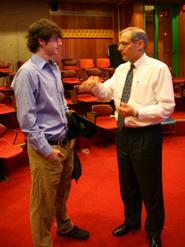
On April 9, John Hewko '79, vice president of the Department of Compact Development at the Millennium Challenge Corporation, discussed the fundamental concepts behind the newly-formed Millennium Challenge Corporation as well as related themes currently being discussed in the realm of the foreign aid debate.
Hewko began his discussion with a synopsis of the Millennium Challenge Corporation (which administers the Millennium Challenge Account), including basic principles and strategies behind its ideals. He explained that the MCC, established in 2004, was a direct response to President Bush's commitment to provide greater resources to nations that take greater responsibility for their economic development. The mission of the MCC is to reduce poverty through economic growth, and this mission is based upon three core principles: that a country maintains good governance and fights corruption, that the country owns its development efforts, and that clear objectives are visible, with a rate of high transparency. Countries eligible for MCC are chosen based on their government transparency, the amount the government invests in its people, and relative economic freedom. Also, countries are evaluated relative to countries in similar economic situations, so as to make the evaluation more objective. As of now, Congress has appointed 7.5 billion dollars to the MCC on a grant system.
Hewko went on to discuss broader themes of foreign aid debate in relation to the MCC. He compared the goals and methods of the MCC to disperse aid with the system of budget support advocated by many European donors.
Finally, Hewko discussed the current debate between Jeffrey Sachs and William Easterly concerning how foreign aid should be distributed. Sachs, Hewko explained, suggests that developing nations are in a poverty "trap" that cannot be broken unless donors provide these countries with significantly larger amounts of money in a comprehensive fashion, thus breaking the "trap cycle." In opposition, Easterly argues that governance plays a key role in that countries should have good governance and accountability and that foreign aid such be provided through a series of more limited interventions, to help countries develop (known as the "piecemeal" approach). Hewko maintained that MCC attempts to "bridge the gap" between these two arguments by giving large amounts of money to developing nations over a period of five years, while at the same time focusing on good governance and effective implementation mechanisms.
Hewko received his bachelor's degree from Hamilton College, a master's from Oxford University and JD from Harvard University. From 2001-02, he was a Visiting Scholar at the Carnegie Endowment for International Peace and was for several years an adjunct professor at Georgetown University Law Center. He speaks Ukrainian, Spanish, Portuguese, Russian and Czech. From 1991-92, he was executive secretary to the International Advisory Council to the Ukrainian Parliament where he advised various Ukrainian parliamentary commissions in drafting the initial Ukrainian laws on foreign investment, anti-competition and corporations. He was recently nominated by President Bush to the position of assistant secretary (Aviation and International Affairs) at the Department of Transportation.
-- by Danielle Raulli '10
Hewko began his discussion with a synopsis of the Millennium Challenge Corporation (which administers the Millennium Challenge Account), including basic principles and strategies behind its ideals. He explained that the MCC, established in 2004, was a direct response to President Bush's commitment to provide greater resources to nations that take greater responsibility for their economic development. The mission of the MCC is to reduce poverty through economic growth, and this mission is based upon three core principles: that a country maintains good governance and fights corruption, that the country owns its development efforts, and that clear objectives are visible, with a rate of high transparency. Countries eligible for MCC are chosen based on their government transparency, the amount the government invests in its people, and relative economic freedom. Also, countries are evaluated relative to countries in similar economic situations, so as to make the evaluation more objective. As of now, Congress has appointed 7.5 billion dollars to the MCC on a grant system.
Hewko went on to discuss broader themes of foreign aid debate in relation to the MCC. He compared the goals and methods of the MCC to disperse aid with the system of budget support advocated by many European donors.
Finally, Hewko discussed the current debate between Jeffrey Sachs and William Easterly concerning how foreign aid should be distributed. Sachs, Hewko explained, suggests that developing nations are in a poverty "trap" that cannot be broken unless donors provide these countries with significantly larger amounts of money in a comprehensive fashion, thus breaking the "trap cycle." In opposition, Easterly argues that governance plays a key role in that countries should have good governance and accountability and that foreign aid such be provided through a series of more limited interventions, to help countries develop (known as the "piecemeal" approach). Hewko maintained that MCC attempts to "bridge the gap" between these two arguments by giving large amounts of money to developing nations over a period of five years, while at the same time focusing on good governance and effective implementation mechanisms.
Hewko received his bachelor's degree from Hamilton College, a master's from Oxford University and JD from Harvard University. From 2001-02, he was a Visiting Scholar at the Carnegie Endowment for International Peace and was for several years an adjunct professor at Georgetown University Law Center. He speaks Ukrainian, Spanish, Portuguese, Russian and Czech. From 1991-92, he was executive secretary to the International Advisory Council to the Ukrainian Parliament where he advised various Ukrainian parliamentary commissions in drafting the initial Ukrainian laws on foreign investment, anti-competition and corporations. He was recently nominated by President Bush to the position of assistant secretary (Aviation and International Affairs) at the Department of Transportation.
-- by Danielle Raulli '10
Posted April 10, 2008
